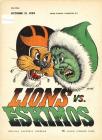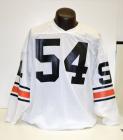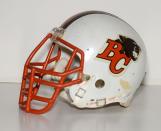2
Since the inception of the British Columbia (BC) Lions in 1954, this football club had to go through the legal red tape just to be part of the Western Interprovincial Football Union (WIFU). From 1951 to 1953, Ken Stauffer, the leader of the group trying to put a professional football team in British Columbia was repeatedly said no by the WIFU. But in a twist the WIFU said to come back in 1952 with a $25,000 bond and have general population interest that a club will be coming into the province, and this is what Mr. Ken Stauffer. With the interest of the population and the bond in hand, Ken Stauffer's group went back to the WIFU, and yet the WIFU still said no because Winnipeg and Regina rejected the idea of a team on the west coast of Canada. With that news, Ken Stauffer's group returned to the WIFU in 1953 and finally sold the idea of having a team on the west coast to the WIFU. On January 22, Vancouver was granted a conditional franchise with these requirements that had to be made; a 15,000 seat stadium, 6,500 season tickets sold, and travel expenses to the other WIRU clubs (Winnipeg, Saskatchewan, Edmonton, and Calgary). With all the requirements made, the BC Lions were ready to play in the 1954 season.In 1954, The BC Lions started their inaugural season. BC played their first game on August 28, 1954 against Winnipeg. Like any expansion team, BC put up a good fight but ended up losing 8-6. The Lions first victory was on September 18 against Calgary when they defeated the Stampeders 9-4. Even though BC lost 15 games that season, BC had about 17,000 people a game that season.
3
As the 1950s progressed, The BC Lions progressed every year by winning more every year. Their best season was during the 1959 season when they finished in third place with a 9-7 record. With that record, they qualified for the playoffs for the first time in franchise history and played Edmonton in two game series, in which Edmonton won with a combined score of 61-15.4
Game program for BC's first playoff game vs. Edmonton.31 October 1959
Empire Stadium, Vancouver, British columbia, Canada

5
The 1960s for the BC Lions proved to be an up and down decade for the club. In 1960, while the Lions finished fourth in the Western Football Conference (WFC) with a record of 5-9-2, but yet the fans still loved their BC Lions. That season, BC drew approximately 30,000 fans per game. In 1961, The Lions had one of their worst seasons in their short history as they went a woeful 1-13-2 and with that record the fans stopped going to games. Compared to 30,000 from last season the crowd for this season was only approximately 24,000 a game.1963 was one of the best seasons for the franchise as the Lions finished first in the WFC for the first time in their short history with a 12-4 record, and had a perfect 8-0 home record, also during that season the BC Lions also reached the Grey Cup for the first time in team history where they played the Hamilton Tiger-Cats in Empire Stadium, and unfortunately for the Lions and their fans, BC lost 21-10.
6
Panoramic view of the 1963 Grey Cup.30 November 1963
Empire Stadium, Vancouver, British columbia, Canada
 Credits:
Credits:Bill Cunningham
7
In the 1964 season, the Lions went 11-2-3, and with that record BC returned to the Grey Cup, once again facing Hamilton, and not like last season, BC defeated Hamilton 34-24 claiming their first Grey Cup in team history.9
From the 1965 to 1968 seasons, BC had pretty sub-par seasons by finishing either in fourth or in last place. During the 1969 season, BC returned to the playoffs by finishing third in the WFC, but got quickly ousted by Calgary in the semi-final.From 1970-1972, BC failed to reach the playoffs. With BC not making the playoffs in those seasons, fan attendance decreased from 31,000 a game to 23,000 a game. In 1973, BC managed to get into the playoffs with a 5-9-2 record. Once in, BC got beaten by Saskatchewan 33-12 in the West semi-final. During the 1974 season, BC once again returned to the playoffs with an 8-8 record and once again played the Roughriders. And like last season, BC lost to Saskatchewan 24-14. BC's next playoff appearance was during the 1977 season, when they finished in second place with a 10-6 record. The Lions first played Winnipeg in the semi-finals and won 33-32 in a tight contest. In the West final The Lions played Edmonton, and was easily dominated 32-1. The Lions last playoff appearance in the 1970s was during the 1979 season, in which BC finished in third place and had to play Calgary in the semi-final in which the Lions lost 37-2.
12
The Lions next playoff appearance was in 1981, in which they finished once again in third with a 10-6 record. In the west semi-final, BC played against Winnipeg and narrowly defeated the Blue Bombers 15-11. In the following week in the West Final, BC played the Edmonton Eskimos, who defeated BC 22-16. During the 1982 season, it was another year out of the playoffs, but in 1983, things change for the better.13
Before the 1983 season, BC hired a new coach in Don Matthews and the Lions said goodbye to Empire Field and started to play at BC Place. This season's team finished in first place (with a record of 11-5) for the first time since 1964, and BC Place will host the Grey Cup that year. In the West Final, BC defeated Winnipeg 39-21 and in front of their home crowd BC played against the Toronto Argonauts for the Grey Cup, and at the end, Toronto defeated the Lions 18-17 in front of 59,409 fans.14
Grey Cup banner promoting the 1983 Grey Cup.Circa 1983
BC Place Stadium, Vancouver, British Columbia, Canada




